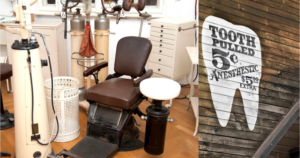The Evolution of Family Dentistry: Past to Present

Are you ready to embark on a journey through time? Venture with us into the fascinating history of family dentistry from its humble beginnings to the modern day—right here in Colleyville, TX.
Graham T. Egger, DDS, is your trusty guide for this adventure. Let’s step into the world of dental care and learn how it has evolved to provide you and your loved ones with the best smiles possible.
Family dentistry in the early days
Picture this: you have a toothache, and the only remedy is a pair of pliers and a strong friend.
Luckily, times have changed! In the past, dentistry was a far cry from the comfortable experience we enjoy today.
Dental care was rudimentary, painful, and often involved extractions.
Graham T. Egger, DDS, is grateful for the advancements that have improved family dentistry in Colleyville, TX, and beyond.
The birth of modern dentistry
The 19th century saw the birth of modern dentistry. Dr. Graham T. Egger’s predecessors started to use anesthesia, making dental procedures significantly less excruciating.
Can you imagine going through a root canal without it? Thanks to innovations in dental tools and techniques, family dentistry was becoming more accessible and humane.
Historical and modern family dentistry
Back in the old days, family dentistry was all about fixing dental problems when they got really bad and painful.
People didn’t visit the dentist until they just couldn’t stand the pain or saw something wrong with their teeth. It was like waiting for trouble to happen instead of stopping it before it did.
But now, in our modern times, family dentistry is embracing prevention.
Dentists like Graham T. Egger, DDS, focus on preventing issues to keep your whole family’s mouths healthy.
They recommend regular checkups and cleanings, not only to fix problems but to catch issues before they become problems.
They also teach families about taking care of their teeth and eating the right foods, so they can make good choices for their dental health. It’s all about helping families have healthy, beautiful smiles.

Historical and modern preventive dentistry
Preventive care was far less valued in the past when it came to dentistry.
Instead of concentrating on problem prevention, people went to the dentist primarily when they were in pain or had obvious dental problems.
The whole point back then was to alleviate the suffering, not to prevent problems from occurring.
In the present day, preventive dentistry has become increasingly important.
Dentists like Graham T. Egger, DDS, prioritize preventive measures to keep your oral health in check.
Regular checkups and cleanings are recommended to catch problems early, even before you feel any discomfort.
Education about oral hygiene and dietary choices is a cornerstone of modern preventive dentistry.
With the help of advanced tools and techniques, dentists can identify potential issues and address them before they become major concerns.
This shift toward prevention ensures that you and your family can enjoy healthier smiles for years.
Cosmetic dentistry: the smile makeover
In the past, dentistry was primarily about fixing issues.
Today, it also includes enhancing your smile. Cosmetic dentistry helps patients achieve that picture-perfect grin.
Graham T. Egger, DDS can help you whiten your teeth, fix misalignments, or even replace missing teeth.
It’s like giving your smile a makeover!
5-point comparison: historical vs. modern dentistry
Approach
Historical: Reactive approach, addressing dental issues when they became painful or visible, and focusing on providing relief from dental issues.
Modern: Proactive approach, emphasizing preventive measures and early issue detection, with a strong focus on early detection and prevention of problems.
Patient age group
Historical: Predominantly focused on adults.
Modern: Extends to comprehensive dental care for patients of all ages, including children, and encourages regular checkups and cleanings, even when there are no apparent problems.
Focus on prevention
Historical: Limited emphasis on preventive measures and patient education.
Modern: Prioritizes preventive measures, including regular checkups, cleanings, comprehensive education on oral hygiene, and dietary choices to maintain good oral health.
Tools and techniques
Historical: Limited diagnostic tools and techniques.
Modern: Utilizes advanced tools and techniques for early issue identification and intervention, enhancing the ability to detect and prevent dental problems.
Frequency of dental visits
Historical: Visits to the dentist were typically infrequent, occurring only when experiencing pain or visible issues.
Modern: Encourages regular visits to the dentist, including those with no apparent problems, as part of a proactive approach to maintaining good oral health.
The future of family dentistry
As we conclude our journey through the evolution of family dentistry, we look to the future.
The field is ever-evolving, with new technologies and techniques constantly emerging.
Graham T. Egger, DDS, is committed to staying at the forefront of these developments to provide the best care possible for families in Colleyville, TX, and the neighboring areas.
A smile-worthy future
With the evolution of family dentistry, we’ve witnessed a transformation from painful tooth extractions to painless, smile-enhancing treatments.
Thanks to dedicated professionals like Graham T. Egger, DDS in Colleyville, TX, dental care is more accessible and comfortable than ever.
The future holds even more promise for healthier, happier smiles.
Schedule your next dental checkup with Graham T. Egger, DDS, in Colleyville, TX today
Or:
- Call us at: 817-656-9366
- Email us at: appointments@grahameggerdds.com
Come visit us at our office in Colleyville, TX. We’re also convenient for those in Bedford, Hurst, Southlake, Euless, North Richland Hills, Keller, Grapevine, Watauga, Richland Hills, and Haltom City.
